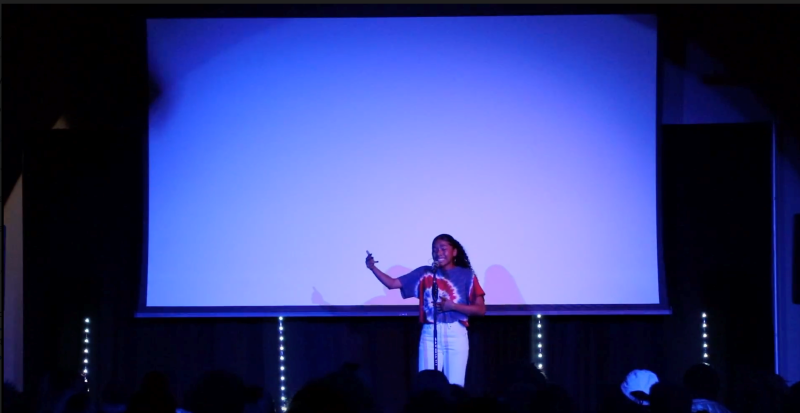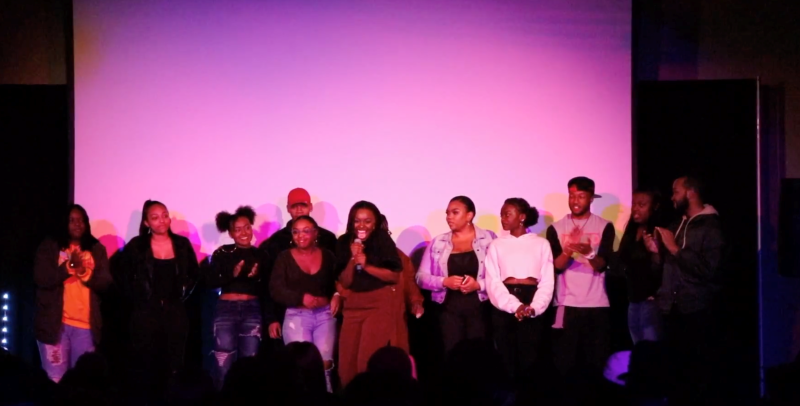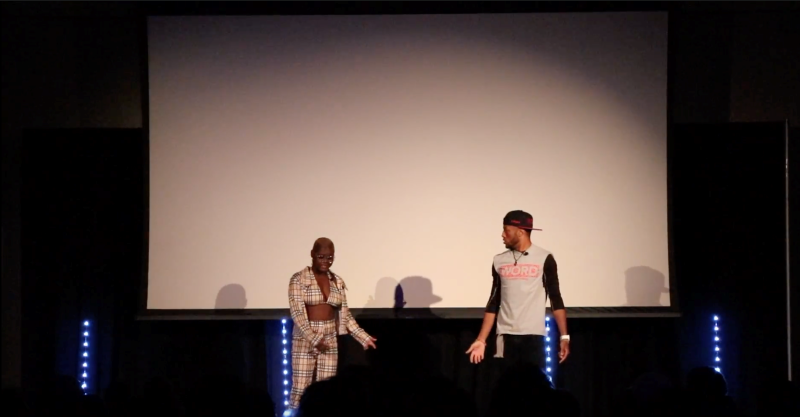Most people in Champaign-Urbana probably don’t know about W.O.R.D., but anyone who has attended concerts with University of Illinois artists performing has probably heard W.O.R.D.
When St. Louis rapper Smino hit the stage at Foellinger Hall toward the end of February, his opener Ausar shouted out Writers Organizing Realistic Dialect, an RSO that centers around spoken word poetry and writing.
It sounded something like this.
Ausar: ‘How many of the people in the crowd tonight are in W.O.R.D?’
Crowd: ‘WOOOOORD!’
Ausar: (laughing) ‘Can I get a WOOOORD?’
Crowd (louder): ‘WOOOORD!’
To those unfamiliar to the organization’s popular call-and-response greeting, it might have felt odd. But to anyone involved in the group, and many present who responded but aren’t actually in W.O.R.D., it’s a sign of unity and togetherness.
W.O.R.D. president Tymmarah Anderson said that the group, which meets every Tuesday and Thursday from 8:00 to 10:00 p.m., has averages about 30 to 40 people per meeting. But vice president of external affairs Joe Manning said they roll 400 or 500 deep on campus when it comes to people loosely affiliated (at one time involved) or friends with students who are and Anderson agreed.
“Our support system and the people that really appreciate what we do is large,” Anderson said. “It’s like the entire black community. If we scream ‘WORD!’, there’s going to be people all around like, ‘WORD! WORD! WORD!’”
Started in 2009, W.O.R.D. is coming up on its tenth anniversary in November, and the group has cemented itself as a popular outlet for students to explore storytelling through writing. W.O.R.D. encourages any and all expressive writing for students, pushing them to share their stories and providing a safe space to do so. Though its membership is primarily black, W.O.R.D. is open to all students and centers around putting on writing and storytelling workshops for its members during each meeting.
For many students on campus, heading to the Ikenberry Commons for W.O.R.D. every Tuesday and Thursday night has become a ritual. The meetings center around the workshops, which last for a bit less than half of the meeting, and toward the end, members take turns sharing what they’ve come up with during the workshop.
Freshman Mark Cole, who just joined the group this semester, recounted a workshop from one of his first meetings.
“One of the ones we did was they gave us a picture and we had to write a story as a group about the picture,” Cole said. “Our picture was literally a hand with a ring on it. The way our story evolved, they gave us that simple thing, and it just turned into a whole love story about love, heartbreak and getting over it.”

W.O.R.D. wants to push its members in expressive and creative directions by providing framework for people to feel comfortable and confident in their writing abilities, thereby equipping them to tell their own personal stories. Whether someone’s story is about having a crush on somebody, dealing with family or relationship issues, or adjusting to a predominantly white campus as a minority, there is no expectation for what members write. But, W.O.R.D. always wants to hear what members come up with.
After each workshop, the person running it — Anderson on the night this reporter was there — will ask who in the meeting wants to share what they wrote. Some members come up and lay complicated, personal writings out in the form of rap verses or spoken word. Others never really share and are just there to support others or because they write for themselves and just need a good environment for it. Whatever brings each student to the workshops, the group’s focus is on empowering individuals, giving them the support needed to go out on a limb and share their stories.
Manning, now a junior, joined W.O.R.D. back in 2016 as a freshman at Illinois. Actually, the group is why he chose to attend the university. He was struck at first sight on his visit as a high school senior and knew he wanted to be a part of what was going on.
“I always tell people that W.O.R.D. is what got me into this university,” Manning said. “I came on a visit, saw a show and was like, ‘Alright, yeah, this is something I want to do when I get here.’ Found them on Quad Day and I’ve been rocking with them ever since.”
But when Manning got on campus in the fall of 2016, things weren’t going as he expected. He was overwhelmed as a first-semester college student, struggling to adjust to the changes that come with campus life, being independent and a plethora of responsibilities. He wasn’t doing well in school, and he admits he was seriously considering dropping out at the time.
“W.O.R.D. actually kept me here on campus as well,” Manning said. “My first semester was not a successful one, I should say, in terms of academics (and) in terms of just adapting to the college lifestyle and just adapting to a predominantly white institution. It was hard for me to kind of make friends and accept people. I wasn’t playing sports anymore like I did in high school. It was kind of like I didn’t know who I was, I kind of lost myself.”
Despite his difficulties here, Manning remembered what drew him in at first, and gave W.O.R.D. a serious look. It only took until his second meeting for Manning to stand up and share something he wrote up. From there, Manning has found a home.
“With W.O.R.D., it allowed me to have this environment, this space where I’m around people who look like me,” he said. “Or even if they don’t, we don’t specify with color, but they relate to something I relate to, which is music. W.O.R.D. definitely kept me here. I was able to vent to a lot of people who I didn’t even know were going through the same things that I was going through.”
Anderson, who didn’t plan to get as deeply involved as she is now when she first slid through to a meeting, thinks it’s the group’s family atmosphere and intensive support system made up by members that make W.O.R.D. special.
“Immediately they felt like family,” Anderson said. “I didn’t feel like I had to prove anything to them, I didn’t feel like I had to say things to fit in. I just felt like myself around them, like the first day. I just kept coming in.”
As president now, she often finds herself trying to make newer and younger members feel the way she did when she first came to W.O.R.D. Anderson said she can count how many meetings she’s missed in her time on campus on one hand.
“I look forward to this every day, it’s like my debrief,” Anderson said. “Sometimes it can be stressful when we’re planning concerts and stuff, but I like just being there with them. I feel like W.O.R.D. has changed my life in a way where I’ve met people in the most rough times in my life. The people that have been there for me the most is W.O.R.D.”

Yes, the group does host concerts, too. Each semester, W.O.R.D. builds up its members, introducing writing tips and techniques through the workshops it puts on, provides support for its members’ work, then it all culminates in a show. Typically, that takes place toward the end of the semester, in November in the fall and April during the spring.
Each performance consists of W.O.R.D. members’ own content, though sometimes the group brings in outside talent to perform as well, like it did two years ago with Chicago rapper Alex Wiley at the Union. Each semester’s show typically runs for about two hours and generates money to fund the group into the future.
“It’s just a way for us to express to the rest of campus like, ‘We’re W.O.R.D., this is what we do,’” Manning said. “If you’re an artist that hasn’t heard of us, or if you’re a poet or just write, or if you like music in general. If you just need somewhere to go where you can work one day, this is what we’re doing. If you find it dope, definitely come talk to us.”
Manning now releases weekly remixes to songs on Instagram based off of people’s requests, and he’s not the only one from W.O.R.D. to start publicly promoting content generated in part because of the group’s encouragement and support. There are probably a dozen or so individuals on campus now, either pushing out songs they record (like Ausar) or Elvin Shields, who goes by El Rell, or in the form of poetry or songs.
What comes out of W.O.R.D. is wide-ranging and unpredictable, which is precisely what people like Manning love about the whole thing.
“(You get) to know so many various groups of people and different types of people,” Manning said. “You can walk into the room, and while everybody’s an artist, nobody is the same as anybody else. They all have so many different personalities. Some are shy, some are very expressive with their feelings, some are funny, some are deep.”
Cole, for his part, has started regularly sharing what he comes up with at meetings. He hasn’t started releasing his content yet, mostly because he feels there’s a long way to go before it’s worthy of pushing. But he sees the progress of his work in only the couple months he’s been going to meetings.
“I feel like I used to write more all over the place,” he said. “I feel like each piece I write now has a point and it flows like an actual piece should. I’m not just rambling into nothing. My rhymes have gotten better and my visuals. The way I put things now, you can imagine it better.”
It’s difficult to sum up what the organization has done for Manning — besides crediting it for his presence at Illinois — but one aspect of the organization he enjoys the most is the lessons he has learned about people and life because of hearing everyone’s stories. It’s a powerful thing, seeing people emerge from their shells to tell their stories.
“You get to know a lot about people,” Manning said. “Just with the fact of them opening up and opening their souls and hearts and minds, just bearing it all for you to witness. It’s very open, you learn a lot about life.”








